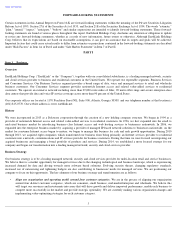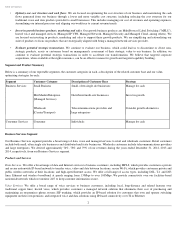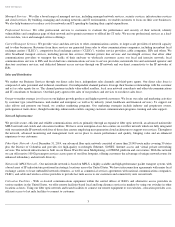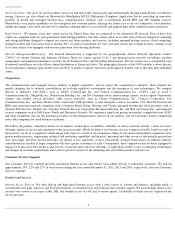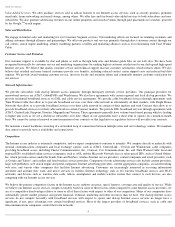Earthlink 2014 Annual Report Download - page 14
Download and view the complete annual report
Please find page 14 of the 2014 Earthlink annual report below. You can navigate through the pages in the report by either clicking on the pages listed below, or by using the keyword search tool below to find specific information within the annual report.
Table of Contents
Special Access
. Special access is a service offered by incumbent carriers that provides for use of dedicated transmission facilities or private lines
by wireline and wireless telecommunications carriers, Internet-based service providers and large enterprise end-
users. We rely on the purchase of
special access services for “last mile”
access to many of our customers' locations. As a result, the price of special access services has a major
effect on our ability to price our retail offerings to meet our gross margin expectations while remaining competitively priced in the retail market.
Incremental increases in the prices of special access services will exert pressure on our gross margins. Since special access services are not
subject to the unbundling requirements of the Communications Act, the prices for special access services have not been directly affected by the
FCC's modification of network unbundling rules. To the extent, however, that the availability of UNE digital T1 lines may have served as a
restraint on the prices charged for special access services, we could face increased prices for special access services given the elimination of such
UNEs in some larger central offices resulting from application of the current unbundling rules.
In 1999, the FCC adopted rules that enable incumbent carriers to obtain pricing flexibility for their interstate special access services in particular
metropolitan areas depending on the level of competition present in that area. We purchase interstate special access services from incumbent
carriers in many metropolitan areas where pricing flexibility has been granted. Depending on the degree of pricing flexibility for which the
incumbent carrier qualifies in particular areas, the incumbent carrier may be entitled to impose contracts with minimum revenue commitments
and bundles of purportedly discounted and non-
discounted services that, in effect, enable the carrier to charge substantially greater prices for
special access services in those areas, while making it more difficult for competitive carriers to offer substitute services. In addition, the FCC has
granted petitions by the incumbent carriers for forbearance from regulation of some special access services, including packet-
switched services
such as Ethernet, and optical carrier services such as OC-3 and higher-
capacity services. These services are not subject to the price regulations
applicable to most other incumbent carrier services and are provided by incumbent carriers solely under contracts, which as noted above may
contain minimum revenue commitments and other restrictive terms.
As a result of the mergers of BellSouth, SBC and AT&T and of MCI and Verizon, the number of providers of competitive access services has
diminished. The FCC and the Department of Justice placed conditions on the AT&T and Verizon mergers to constrain the ability of AT&T and
Verizon to raise prices on their wholesale special access and equivalent retail services, but these regulatory pricing constraints have now expired.
AT&T and Verizon are therefore free to realign charges for special access services with current commercial rates. Because a substantial portion
of our services are delivered over special access lines purchased from AT&
T and Verizon, a significant increase in the price for special access
could substantially increase our cost of services.
The FCC currently is considering whether and how to reform its special access rules. In 2012, the FCC suspended consideration of new petitions
for metropolitan area pricing flexibility by incumbent carriers, but this decision does not affect previously-
approved pricing flexibility. The FCC
is in the process of gathering extensive data concerning the special access market to allow it to formulate new pricing rules, but this project is
likely to take considerable time to complete. We rely to a considerable extent on interstate special access services purchased from the incumbent
carriers in order to connect to our customers. We cannot predict when the FCC will issue a decision regarding special access prices or how any
such decision will affect our business. A significant increase in the price for special access could materially increase our cost of services.
Additional pricing flexibility for special access services offered by the incumbent carriers could place us at a competitive disadvantage, both as a
purchaser of access and as a vendor of access to other carriers or end-user customers.
Certain ILECs have expressed an intention to begin discontinuing DS1 and DS3 special access services or at least certain term plans that provide
us with discounts on these services. Under the FCC’
s current rules, this could eliminate our ability to serve certain customers or increase the cost
of doing so. However, in November 2014, the FCC adopted a Notice of Proposed Rulemaking in which it tentatively concluded that “
to receive
authority to discontinue, reduce, or impair a legacy service that is used as a wholesale input by competitive providers, an ILEC must commit to
providing competitive carriers equivalent wholesale access on equivalent rates, terms, and conditions.”
We cannot predict whether the FCC will
adopt this tentative conclusion as a rule or, if it does so, when this would occur. If the FCC does ultimately adopt this tentative conclusion as a
rule, it could reduce the risks associated with discontinuance.
Universal Service.
The Communications Act and the FCC's rules provide for a federal USF, which is intended to subsidize communications
services in rural and high-cost areas, services for low-
income consumers, and services for schools, libraries and rural health care providers.
Currently, the FCC assesses all providers of telecommunications services, interconnected VoIP services, and certain providers of
telecommunications a percentage of interstate and international revenues received from U.S. retail customers. We are subject to this contribution
requirement. Providers are permitted to pass through their USF contribution assessment to their customers in a manner consistent with FCC
billing regulations. The FCC is considering a number of proposed changes to the method of assessing these USF contributions, but we cannot
predict when it may reach a decision or what types of changes may be adopted.
9




